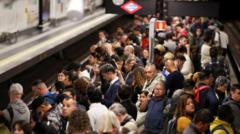On Monday, Spain faced an unprecedented blackout that disrupted daily life, transportation, and critical services for nearly 23 hours. With power returning by early Tuesday, the focus is not only on restoration but also on understanding the factors that led to this massive outage and measures to prevent its recurrence.
Prime Minister Pedro Sánchez noted that 15 gigawatts of electricity were lost at 12:33 PM, leading to a sudden power collapse. The outages were traced to two consecutive disconnection events in southwestern Spain, an area reliant on solar energy. By that time, around 60% of Spain's power was generated from solar sources, with additional contributions from wind and nuclear power.
As the grid operator Red Eléctrica embarked on the challenging task of re-energizing the system, safety concerns dictated a cautious approach to avoid further overloading. Hydroelectric plants and combined-cycle gas facilities were primarily utilized to restore electricity, although several nuclear reactors had shut down automatically during the outage.
International cooperation proved vital; both France and Morocco aided Spain's recovery by supplying additional power through high-voltage lines. Electricity provisioning from these neighboring countries helped restore services throughout the nation, prioritizing hospitals and essential infrastructure.
As power began to return, Spanish citizens displayed remarkable resilience. Hospitals maintained critical operations with generator backup, and local authorities organized shelters for stranded travelers. However, criticism has emerged regarding the government's handling of the crisis, with some officials calling for better infrastructural safeguards against dependency on renewable energy.
The economic ramifications of the blackout are still being assessed, with estimates of a €1.6 billion impact. Amid the fallout, Spanish leaders are reiterating their commitment to learning from this crisis to ensure a sustainable and safe energy future. Experts caution, however, that without necessary infrastructure improvements, such blackouts could occur again.


















